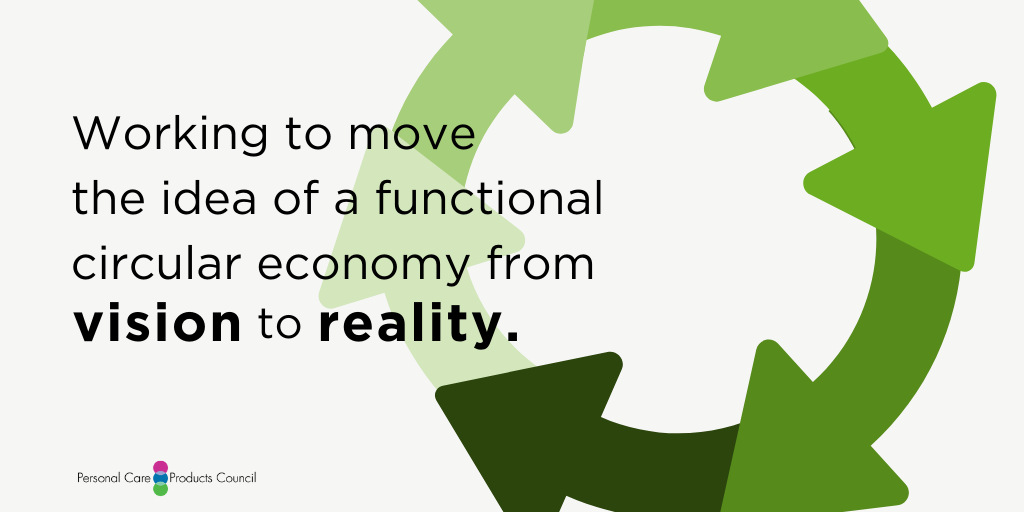Three Global Perspectives on Legislation from SPC Engage
PCPC aims to support the beauty and personal care industry’s sustainability practice and reputation through programmatic elements and initiatives, by sharing best practice, stakeholder education and engagement, and strategic communications.
As consumers increasingly demand sustainability from brands and businesses face mounting investor and regulatory pressures, public policymakers around the world are looking for solutions to reduce packaging waste and progress towards a circular economy, including Extended Producer Responsibility (EPR) programs, stewardship programs, and material bans or taxes. EPR policies recognize that a manufacturer’s responsibility for its product and packaging extends to its post-consumer use, attempting to shift some financial and management responsibility for a product’s impacts upstream to the manufacturer and away from the public sector. In doing so, these policies incentivize manufacturers to integrate environmental considerations into the design of their products and packaging.
The recent Engage 2021 virtual conference, hosted by the Sustainable Packaging Coalition (SPC), focused on circular economy and EPR initiatives, highlighting legislatives activities around the globe.
By Lucy Pierce, Project Coordinator, Sustainable Packaging Coalition

Design for a Circular Economy, one of the themes of this year’s SPC Engage, highlighted programs, research, and legislation around the world helping move the idea of a functional circular economy from vision to reality. Highlights include:
EPR Transition in Canada
Usman Valiante from Corporate Policy Group highlighted the Canadian perspective when he said “Extended Producer Responsibility (EPR) programs in Canada are in transition.” Currently, the EPR programs are transitioning from producers only paying for municipal recycling services to gaining operational control of the recycling systems for residents. Valiante is optimistic that this transition is creating opportunities for harmonization between residents and provinces in Canada and leading to large-scale investments in advanced sorting technology across the country. While this transition for Canada has challenges ahead, Valiante is confident the technical and political expertise of the country will support changes for the better.
Ending Single-Use in Chile
The panel discussion “Chile’s Journey to a Circular Economy” proved that Europeans are not the only ones engaging in ongoing political action to combat the take-make-waste, linear economic model. According to the panel, Chile passed EPR legislation for packaging in 2013. This year in 2021, Chile unanimously passed a law related to banning single use-plastics and promoting reusables that were not addressed in the previous EPR law. Mark Minneboo from Plastic Oceans Chile described the new legislation as specifically designed for restaurants, delivery, and takeaway to cover more of the single use outlets in Chile. This new legislation is not meant to be an outright ban, but rather an effort towards regulation. Guillermo Gonzalez Caballero of Chile’s Ministry of the Environment added the thought that, if all single use plastics are banned, the immediate result would just be a different single use material. This law is rethinking single use by promoting reusables and preventing single use items inside food establishments.
Onshore Development in Australia
Like the United States, Australia has a three-tiered government system in place. Federal, state, and local entities work together to manage waste and recycling for the country. The varying levels of government can make it difficult to standardize recycling collection and processing, which combined with the 2018 global impacts of China’s National Sword program, prompted Australia to implement new legislation. Brooke Donnelly of the Australian Packaging Covenant stated that the Recycling and Waste Reduction Act of 2020 is centered around ensuring Australia’s appropriate participation in the global recycling market. The legislation tightens up global market standards and aims at building domestic capacity, to rely less on the exportation of materials. As an island country and continent, this is no small task.
Overall, these Circular Economy-centric sessions at SPC Engage 2021 shed light on the packaging and recycling legislation happening across the globe. Policy was identified as a buzzword for the development of the circular economy and paying attention to global insight is especially important to disrupt the current linear model of consumption. These sessions gave new meaning to the phrase “Think globally, act locally.”

